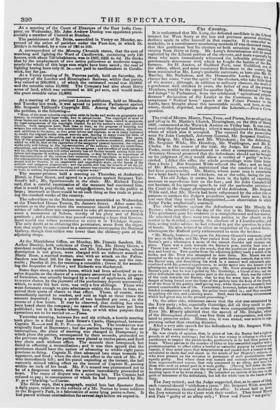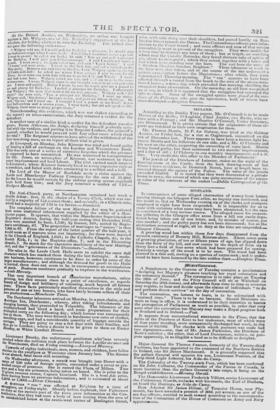The t rial of Messrs. Muntz, Pare, Trow, and Pierce,
for an alleged riot and affi ay in St. Martin's Church, Birmingham, on the 28th of Match 1837, commenced at the Warwick Assizes on Friday last. It was conti. mined over that duty and Saturday ; when it was adjourned to Monday, the whole of which also it occupied. The counsel for the prosecution were Sir John Campbell, Attorney- General, Mr. Sergeant Goulburn, Mr. Balguy, Mr. Clarke, and Mr. Whitehurst ; for the defendants,
Mr. Sergeant Wilde, Mr. Humfrey, Mr. Waddington, and Mr. E. Clarke. In the course of the trial, the Judge, Sir James Allan Parke, more than once endeavoured to effect a compromise; and the Attorney-General promised that the defendants should not be brought up for judgment if: they would allow a verdict of " guilty" to be re. corded. [After this offer, the whole proceedings were little better than a farce.1 But Sergeant Wilde refused the offer ; and on Walt of Mr. ATuntz, especially, maintained that the conduct of his client had been praiseworthy. Mr. Alturtz, whose outer man is remarkable for a large bushy beard and whiskers, sat at the table, facing the jury. box. The old Judge, it seems, has been in the habit of expressing aversion to superfluous hair on the face ; and Sir John Campbell did not hesitate, in his opening speech, to call the particular attention of the Court to the shaggy physiognomy of the defendant. Mr. Sergeant Wilde said, that Mr. Altinta had been subpoenaed by the other side on purpose to awaken the Judge's prejudices against hairy men ; but he was sure that they would be disappointed,--an observation to which Judge Parke emphatically assented.
The chief witness against the defendants was Alt. Mosely, the Rector ; who presided on the day of the riot in St. Martin's Church. This gentleman gave his evidence in a straightforward and fair manner, Ile admitted that there were two keen parties in the church on the matter to be decided,—namely, the election of a Churchwarden; and that, acting under advice, he had refused to put the question by a show of hands. Ile also refused to allow an inspection of the parish.bucks; whereupon the Radical party endeavoured to seize the books- " Mr. Mosely, however, (we quote the Attorney-General's statement,) place/ his arm on the books, arid Mr. Pare rushed from his place and made for the Rector's pow; whereupon a scene of the utmost disorder and violence took place. There was a rush towards the Rector's pew, amidst loud cries of Throw him over.' Such was the crush, that the partitions of the pews gave way and burst in. Two youths from the adjoining gallery made a snatch at ills books, and Mr. Trovr also attempted to seize them. Mr. Mums was wen mounted on the top of the partition of the pews leading towards that in which the Rector was, and flourishing his stick m a manner well calculated, alas combined with his general appearance, to strike terror into the breasts of ha adversaries, and to encourage his own party. Mr. Trow attempted to enter tit Rector's pew ; but he was repelled by Mr. Guttritlge, a friend of his; and the other defendants also took an active part in the ttnnult. Such was the violena of the rush towards the Rector, that be was for some time in the greatest danger of being forced over the front of the gallery into the body of the church, or of the front of the gallery itself giving way, when there must necessarily have ensued considerable loss of life. Fortunately, however, before any of the appr5. handed consequences took place, the police were called in ; and they succeeded in quelling the riot, and restoring peace. Such were the leading circumstances which had given rise to the present proceeding." On the other side, witnesses swore that the riot was occasioned by the Tory party ; who, especially Guttridge, did all they could to prfs yoke the Radicals, who for some time were comparatively temperate. Even Mr. Mosely admitted that the speech of Mr. Douglas, editor of the Birminyhana Journal, was free from all exasperation, and calcu. lated to preserve order. Aluntz, too, it was stated, was active in sup- pressing rather than creating disorder.
After a very able speech for the defendants by Mr. Sergeant Wilde, Judge Parke summed up- " lie was clearly of opinion, that, in point of law, the Rector had a right IS
preside at all vestry meetings ; but that he was wrong in refusing to allow ail parishioner to inspect the parish-books, particularly as he haul them preseutins court. Where parties to the number of three or four assembled together with predetermination to effect either a lawful or unlawful purpose by violence sada, tumult, if they acted upon that determination and caused such a tumult as w calculated to excite fear and alarm in the minds of her Majesty's aubjects, who were present on the occasion in pursuance of such premeditation it. equally guilty. But where there was tumult and violence which sprung from unpremeditated causes, that only amounted to an affray, and nohne_ah:Pat those who took art actual part in it were guilty. Playing laid down the leo he then proceeded to read over the whole of the evideece.from notes, CO meriting upon it as he went along.] He intimated no opinion of his own o _re guilt or innocence of the defendants, but left the whole case an the hands M Jury. The Jury retired ; and the Judge suggested, that, as in cases of lnibelcr, each oounsel should "withdraw a juror." Mr. Sergeant Wilde asse ()Our, but the Attorney- General declined the offer. In about half b the Jury returned to the Court with their verdict. They
found
and Pare " guilty of maaffray only; " 'frow and Pierce " not gull
Iriutnyt.z„
At the Bristol Assizes, on Wednesday, an action was brought
against a Mr. Widgery, ef Dvrkelty.s stipporic is at the last election, for bribing electors to vote for Bei kelt y. The bribed elec- tor gave the following evidence- „ widgery tem me, if I would poll for ilerke!ey it plumper, 1.o would give me bolf-a-sovereign when I came buck. I to:d hito I %%mild not n;„!, a In ti. I went to go out: he called me buck ; he bald, You go and pell a plumper for Berkeley, I will give y Oa hait-a.sovereign.' I said I would not molt t it pound. I went away ; again called me, and said • Yvu'd better.' 1 ; I wont,' and went away. 1 went to the New Init. and got a set ip from the Blue party.. Between one and two in the day, I saw Wulgerr. vgain tat the top d Castle-mill-hill : he asked me where I was genig ; I said to vote far the Blues: he or some one with him told me to go the Cot and Wine'!, I went, Aid had some beer. Widgery me cut, and me to go to the emo- raitteedoom. I went, Widgery came in and brought a Mall to go and poll with me. I went and pellet!. Before I went, he said he would give me a _pound to go and plump for Berke!ey. I polled a plumper for Berkeley. I atterwatds eaw Widgery ; the iii in that went with me was present. Widgery said, ' All right?' the man said, Yes, a plumper for Berkeley.' I went up stairs. Vidgery said, '60 down ;' he came down, and gave nue fifteen shilling-I. 'Go on,' and I went on. I thought I had a pound in my ham!: it wits four half-crowns and a crown piece. I went back; but did not speak to :Ur. 'Widget'', there were so many people there.”
Notwithstanding this evidence, which was not shaken (according to the report) on cross-examination, the Jury returned a verdict for the defendant.
In another case of a similar kind, a verdict for the defendant was also given; Baron Alderson, the Judge, declaring himself perfectly satis- fied with the verdicts, and putting it to Sergeant Ludlow, the plaintiff's counsel, whether he would proceed with four other cases which stood for trial ? The Sergeant appears to have advised the withdrawal of the four remaining ones, as no report of their trial is given.
At Liverpool, on Monday, John Kinnear was tried and found guilty of forging a bill of exchange on the London and Westminster Bank. This was only one of a series of extensive forgeries which the prisoner is supposed to have committed. He was sentenced to transportation for life. Jones, an accomplice of Kinnear, was sentenced to three years' imprisonment and hard labour. The trial excited much interest in Liverpool; where Kinnear formerly lived in a very expensive style as a merchant, and failed with debts amounting to a million and a half.
The Lord of the Manor of Rochdale made a claim against the Leeds and Manchester Railway Company for the sum of 31,200/. for the losses he would sustain by the railway passing across copyhold lands held from him; and the Jury returned a verdict of 1501.— &dyer! Herald.



























 Previous page
Previous page